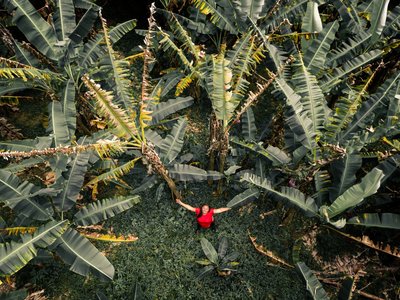
Agroforestry: Palm Oil AFS
The Palm Oil Agroforestry System (AFS), is a partnership between Natura, the Brazilian Agriculture Research Company (Embrapa), the Tomé-Açu Mixed Agricultural Cooperative (Camta), the United States Agency for International Development (USAid), and the International Centre for Research in Agroforestry (ICRAF). The initiative follows the guidelines of the Roundtable on Sustainable Palm Oil (RSPO) and the UEBT. It is a nature-based solution for the production of palm oil via regenerative agricultural practices. The solution mimics the dynamics of a biodiverse forest.
The project was launched in 2008 and, in 2021, after 13 years of research, it began supplying the raw-materials for the Biōme line of bar-shaped products and plastic-free packaging.
In 2024, Natura signed a cooperation agreement with the Department of Family Farming of the State of Pará (Seaf) as a means of moving ahead with the project. This step forward meant that a partner was brought into the initiative, demonstrating a strategic commitment to the development of public policies that involve the adoption of regenerative practices.
The Palm Oil AFS will also have a positive social environmental impact by enabling carbon sequestration, increasing climate resilience and doubling the income of the farmers.
The project, that is currently in a phase of expansion, covers 413 hectares through its partnership with Camta (Tomé-Açu Mixed Agricultural Cooperative), and is set to occupy 650 hectares during the present 2024/2025 harvest year. We aim for 45,000 hectares to be occupied by a Palm Oil AFS by 2035, based upon our own investments and those made through partnerships with other companies and institutions. The Palm Oil AFS will also have a positive social environmental impact by enabling carbon sequestration, increasing climate resilience and doubling the income of the farmers due to the greater diversity of producers, when compared to the palm monoculture.
Association of Female Agro-extractivists
GRI 414-1
In 2024, we established a new relationship with the Association of Female Agro-extractivists of Médio Juruá (ASMAMJ), located in the municipality of Carauari (AM). By means of this partnership, we achieved our target of 45 communities in the Amazon region.
Community Social Progress Index (IPS)
We use the Social Progress Index (SPI) to measure the social and environmental performance of the agro-extractivist communities and regions where we also operate to inform the Strengthening of Communities and Regions aspect of our strategy, based upon a model that combines environmental conservation and regeneration with the generation of revenue. The SPI was applied to three territories in the states of Amazonas and Pará (Juruá, Tapajós and Baixo Tocantins) between 2015 and 2022, an initiative that involved the collection of primary data. In 2024, we revised and customized the methodology, with the aim of making the collection more agile and easier, allowing for a gain in scale for application throughout the area in which we operate in the Amazon region. The revised methodology was applied in the form of a pilot scheme in four regions (Juruá, Baixo Tocantins, Marajó and Acre-Alto Madeira) in 2024, and is to be expanded to the other regions as of 2025.
R$ 1.9 million in payments for environmental services to the community, preventing 68,000 tons of greenhouse gas emissions. In total, the Reca project has already prevented more than 368,000 tons of CO2 emissions.
Payment for Environmental Services
Since 2016, in partnership with the Consortium and Densified Economic Reforestation Cooperative (Reca), based in Porto Velho (RO), we have been running a Payment for Environmental Services (PES) project focused on carbon offsetting. This operates together with the Reca production chain and family farmers, with a strategy designed to recompense the farmers for the efforts they make to conserve the forest and employ sustainable production methods in the farming of socio-biodiversity assets. In 2024, we paid BRL 1.9 million for environmental services, preventing 68,000 tons of greenhouse gas emissions.
In total, the Reca project has already prevented the emission of 368,000 tons of CO2. Reca has had a close relationship with Natura since 2001, focused on the supply of capuaçu butter, and andiroba and Brazil nut oils. The project has already seen BRL 7.8 million in payments for the creation of carbon credits, which have positively impacted 270 families and conserved 2,650 hectares of forest area.
Amazônia Viva Funding Mechanism
This mechanism began operations in 2024, and has raised BRL 21 million for the credit vehicles [Agribusiness Receivables Certificates (CRA) and the Enabling Conditions Facility (ECF)], whilst also involving the Vale Funding Fund, Good Energies Foundation, Natura and the International Finance Corporation (IFC) as investors. The project, developed by Natura, in partnership with VERT Securitizadora and the Brazilian Biodiversity Fund (Funbio), began with an operation that benefits 13 agro-extractivist cooperatives and associations in the region, having a positive impact on more than 2,500 families.
Over the coming years, we estimate that the Amazônia Viva initiative will boost economic and sustainable development in 16 regions, increase the production of more than 40 agro-extractivist cooperatives and associations, and benefit more than 10,000 families in the region
In 2024, as a means of strengthening the governance of the mechanism, we created the Advisory Board, involving the participation of Natura, the Vale Fund, two representatives from local communities and one representative from civil society.
All the cooperatives and associations that accessed the CRA in 2024 received financial management support from a consulting firm. This contributed to there being no cases of default in the first year of the initiative. At the end of the year, seven participants returned to access the mechanism to fund their harvests in 2025. Operation of the Funding Mechanism is made possible by means of two principal instruments:
- The issuance of CRAs by VERT, which provides agro-extractivist cooperatives and associations with advance financing. The funds can be used as working capital for the annual harvests, making the operations more efficient and increasing productivity.
- Enabling Conditions Facility (ECF), a fund containing non-reimbursable (philanthropic) financial resources created by Funbio. The aim is to support initiatives designed to strengthen the operational and institutional aspects of the socio-biodiversity chains and address structural challenges in the regions, providing specific support for young people and women.
The aim of the Amazônia Viva initiative is to provide the region’s agro-extractivist cooperatives and associations with access to funding systems. The objective is to strengthen the socio-biodiversity chains and their territories in the Amazon region, based upon a model that combines the generation of income with environmental conservation and regeneration.
The issuance of debentures strengthens the bioeconomy
In 2024, Natura became the first Brazilian company to issue debentures tied to the bioactives of the Amazon region. We raised BRL 1.32 billion, with the International Finance Corporation (IFC) contributing BRL 300 million, and the Inter-American Development Bank (BID) another BRL 200 million.
Under this model of debentures emissions, in the format of sustainability-linked bonds (SLBs), there are specific sustainability targets attached to the funds. One of the leading commitments is the development of Amazon bio-ingredients. With the IFC and IDM as investor, the contributions undergo a process of rigorous due diligence, ensuring compliance with international standards of sustainability and ethics.
